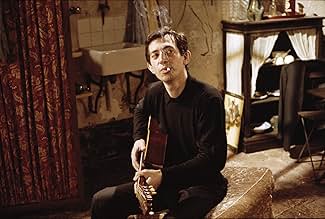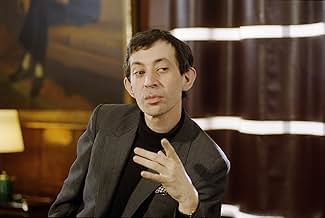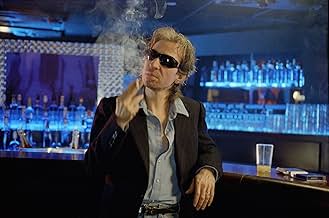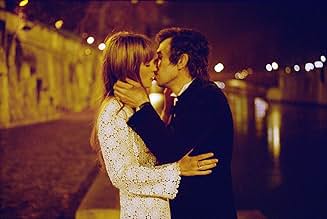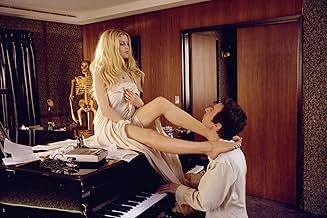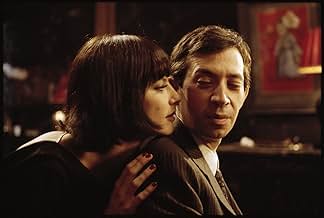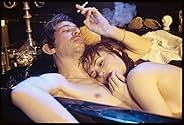Gainsbourg (Vie héroïque)
- 2010
- Tous publics
- 2h 15min
NOTE IMDb
6,9/10
11 k
MA NOTE
Un aperçu de la vie du chanteur français Serge Gainsbourg, de son enfance à Paris occupée par les nazis dans les années 1940 à ses années d'écriture dans les années 1960 jusqu'à sa mort en 1... Tout lireUn aperçu de la vie du chanteur français Serge Gainsbourg, de son enfance à Paris occupée par les nazis dans les années 1940 à ses années d'écriture dans les années 1960 jusqu'à sa mort en 1991 à l'âge de 62 ans.Un aperçu de la vie du chanteur français Serge Gainsbourg, de son enfance à Paris occupée par les nazis dans les années 1940 à ses années d'écriture dans les années 1960 jusqu'à sa mort en 1991 à l'âge de 62 ans.
- Récompenses
- 7 victoires et 11 nominations au total
Dinara Drukarova
- Olga Ginsburg (la mère)
- (as Dinara Droukarova)
Avis à la une
As an Englishman I didn't have as much of an idea of Serge Gs career as most of the previous critics here, so a lot of this film was pretty educational. However, it wasn't a literal biopic by any means, using the cartoon characters alongside Serge (quite well, I thought) and the latter half of his life (I didn't realise when or whether he'd died until I'd read one of your reviewers!) seemed to tail off into nothing, even more than his increasing physical degradation was suggesting.
I found the emphasis on his sexual groundbreaking and role as a general iconoclast a bit similar to the film "Mesrine" which came out a year or two back - a similar time period was covered in that - masses of smoke and sexism! The actresses playing Jane Birkin and Juliette Greco are good (especially Jane Bs English/French accent) but "Brigitte Bardot" less so, and the scenes with her do go on a bit (although some of the poses are meant to correspond with real Bardot roles like "Et Dieu Crea La Femme" and "La Mepris".
The music fits in well with the film and, surprisingly - with the film making style - the intrusion of early 1960s loud pop, and of reggae, is quite a shock to the system, as it is intended to be, and was at the time. Perhaps I'm missing some of the French references, but in general the milieu Gainsbourg moved in might not be best served by a "straight" biopic with a Nicholas Cage-type performance, but the surrealist cartoons do detract from the picture we get of Serge - and believe me, it's not that easy to like him! I wasn't that keen on the precocious young boy stage of his life either - a bit too "that's the French way boys grow up" all very pre-Simone de Beauvoir.
Anyway shouldn't carp too long - I was glad I saw it and a lot will stay with me, although I'll remember the Django-type guitar playing possibly longer than the (apparently rather few) Gainsbourg songs which graced the soundtrack.
I found the emphasis on his sexual groundbreaking and role as a general iconoclast a bit similar to the film "Mesrine" which came out a year or two back - a similar time period was covered in that - masses of smoke and sexism! The actresses playing Jane Birkin and Juliette Greco are good (especially Jane Bs English/French accent) but "Brigitte Bardot" less so, and the scenes with her do go on a bit (although some of the poses are meant to correspond with real Bardot roles like "Et Dieu Crea La Femme" and "La Mepris".
The music fits in well with the film and, surprisingly - with the film making style - the intrusion of early 1960s loud pop, and of reggae, is quite a shock to the system, as it is intended to be, and was at the time. Perhaps I'm missing some of the French references, but in general the milieu Gainsbourg moved in might not be best served by a "straight" biopic with a Nicholas Cage-type performance, but the surrealist cartoons do detract from the picture we get of Serge - and believe me, it's not that easy to like him! I wasn't that keen on the precocious young boy stage of his life either - a bit too "that's the French way boys grow up" all very pre-Simone de Beauvoir.
Anyway shouldn't carp too long - I was glad I saw it and a lot will stay with me, although I'll remember the Django-type guitar playing possibly longer than the (apparently rather few) Gainsbourg songs which graced the soundtrack.
I did watch this film in it's premiere in Athens, at the festival of Franchophone films.I liked the movie which incorporated many surreal and fantasy elements in the linear narrative of the life of the hero. He had an alter ego, which was the substantiation of a childhood fantasy which always tried to tempt him to follow the broad path that led to riches, fame, sex and power. He followed the advice of his evil other self and he became the public icon we know from history and the media. Emphasis is also given to his Jewishness and his courage to manifest it before collaborationist authorities as a young boy.
Excepting the marked surreal elements which the director in an introductory speech attributed to the fact that he is also a comic strip creator, the film emphasizes what we already know, that is his incessant womanizing, publicity seeking and studied provocative stance, culminating in his memorable if controversial rendering of the Marselleise-the French national anthem-in a reggae music version and a refrain that was full of irony.
The sometimes overemphasized description of his rampant sexuality drove some of the audience out of the theatre as did the depiction of his reggae version of the French national anthem. But this was obviously an overreaction due either to ignorance or desire to cut a figure. If you had the slightest idea of who Gainsbourgh was, you would not be expecting anything else from a movie dedicated to his life story.
Because Gainsbough was prone to the pleasures of the flesh with women famous or ordinary, many impressive actresses such as Laetitia Casta and Anna Muglalis appear in the movie portraying the gorgeous women he had affairs with. The whole impression you form is that he had been a anti-authoritarian bobo(bourgeois-Boheme) before this term had been invented.
There is also a sensitive depiction of his relationship with his parents, which was closer and more intimate than one would expect from a man who had such an obvious (real or affected) grudge towards authority.The actresses play convincingly the women of his life, who were glamorous and sexy. In the end one is left with the question whether such a life is enviable and worthy of emulation or example to avoid. whichever answer each one reaches, as a spectacle it is surely interesting to see.
Excepting the marked surreal elements which the director in an introductory speech attributed to the fact that he is also a comic strip creator, the film emphasizes what we already know, that is his incessant womanizing, publicity seeking and studied provocative stance, culminating in his memorable if controversial rendering of the Marselleise-the French national anthem-in a reggae music version and a refrain that was full of irony.
The sometimes overemphasized description of his rampant sexuality drove some of the audience out of the theatre as did the depiction of his reggae version of the French national anthem. But this was obviously an overreaction due either to ignorance or desire to cut a figure. If you had the slightest idea of who Gainsbourgh was, you would not be expecting anything else from a movie dedicated to his life story.
Because Gainsbough was prone to the pleasures of the flesh with women famous or ordinary, many impressive actresses such as Laetitia Casta and Anna Muglalis appear in the movie portraying the gorgeous women he had affairs with. The whole impression you form is that he had been a anti-authoritarian bobo(bourgeois-Boheme) before this term had been invented.
There is also a sensitive depiction of his relationship with his parents, which was closer and more intimate than one would expect from a man who had such an obvious (real or affected) grudge towards authority.The actresses play convincingly the women of his life, who were glamorous and sexy. In the end one is left with the question whether such a life is enviable and worthy of emulation or example to avoid. whichever answer each one reaches, as a spectacle it is surely interesting to see.
There was probably a good few hundred reasons to fail that movie about the life of the most famous french song writer but I was happy to find out the director didn't fall in any of these traps. This movie was poetic, touching, elegant and engaging. Retracing Lucien Ginsburg's life with style and a touch of romanticism, the two hours unfolded so quickly that I was almost surprised when the credits started to roll. From his childhood in Nazi occupied Paris to his encounters with Boris Vian or Les Freres Jacques, from his rise to success with Bardot or Jane Birkin, the story marks all the important moments in the life of this unforgettable composer that has left many generations dazzled by his craftsmanship.
Eric Elmosnino is simply gigantic in this role, conjuring all the greatness of Serge Gainsbourg, letting us get a glimpse of its never seen before talent as well as his fragility. The staging of an alter ego representing his genie, pushing and pulling him to become the man we know is right on the spot to express his inner conflict to choose between painting and music. Music is a minor art, the man used to say as he recorded albums upon albums that are still to this day amongst the most compelling creations in french song writing. Many bits of lyrics used throughout the movie are poking the aficionado in the best way possible.
Avoiding the traps of linear storytelling as it has to respect chronological events, it goes back and forth through time using the protagonist at different periods of his life to put in perspective what goes on in his mind. From young Lucien to l'Homme à Tête de Chou, from the fusion of Serge with his genie to become Gainsbarre, I spent an exquisite moment in the life of a man whose music and lyrical excellence have touched me as a teenager and still remain a defining influence in my life. No need to say the music is beautifully embedded in this graceful biography.
The only minor inconvenience I could point out is Laetitia Casta that plays Brigitte Bardot without an ounce of talent, but fortunately these scenes are short and quickly forgotten. I recommend this film to anyone that has remotely enjoyed Gainsbourg's artwork at any point in his life for it is an amazing and poetic experience you will not regret. It is brilliantly shot and edited with both rhythm and attention to quiet emotional scenes. It takes you up and down with the protagonist's questioning about the meaning of his life and his descent to hell from which he never came back. Thank you Johan Sfar.
Ugliness is in a way superior to beauty because it lasts.
Serge Gainsbourg
(www.radiostationexp.blogspot.com)
Eric Elmosnino is simply gigantic in this role, conjuring all the greatness of Serge Gainsbourg, letting us get a glimpse of its never seen before talent as well as his fragility. The staging of an alter ego representing his genie, pushing and pulling him to become the man we know is right on the spot to express his inner conflict to choose between painting and music. Music is a minor art, the man used to say as he recorded albums upon albums that are still to this day amongst the most compelling creations in french song writing. Many bits of lyrics used throughout the movie are poking the aficionado in the best way possible.
Avoiding the traps of linear storytelling as it has to respect chronological events, it goes back and forth through time using the protagonist at different periods of his life to put in perspective what goes on in his mind. From young Lucien to l'Homme à Tête de Chou, from the fusion of Serge with his genie to become Gainsbarre, I spent an exquisite moment in the life of a man whose music and lyrical excellence have touched me as a teenager and still remain a defining influence in my life. No need to say the music is beautifully embedded in this graceful biography.
The only minor inconvenience I could point out is Laetitia Casta that plays Brigitte Bardot without an ounce of talent, but fortunately these scenes are short and quickly forgotten. I recommend this film to anyone that has remotely enjoyed Gainsbourg's artwork at any point in his life for it is an amazing and poetic experience you will not regret. It is brilliantly shot and edited with both rhythm and attention to quiet emotional scenes. It takes you up and down with the protagonist's questioning about the meaning of his life and his descent to hell from which he never came back. Thank you Johan Sfar.
Ugliness is in a way superior to beauty because it lasts.
Serge Gainsbourg
(www.radiostationexp.blogspot.com)
Lucien 'Serge Gainsbourg' Ginsburg. Artist. Writer. Performer. Alcoholic. Smoker. Rebel. Womanizer. Genius? Joann Sfar's film documents the sporadic lifestyle of the famous French artist Serge Gainsbourg (Eric Elmosnino), whose life contained no boundaries, no objects off limit, and continually tested the patience of those huddled together around him. Beginning with a young Gainsbourg developing his taste for painting aspiring models in Nazi-Occupied France as a mere teenager, the film thereupon concentrates primarily upon his relationships with various beautiful women and his life choices in regards to his ever-changing occupation over his sixty-year-life-span.
What makes this film work so well as a biopic is the truly ingenious performances by both Kacey Mottet Klein (Young Gainsbourg) and Eric Elmosnino (Adult Gainsbourg) who both somewhat beautifully represent such a tragic figure throughout his whole on-screen lifetime. Kacey portrays Gainsbourg as a boy who is maturing faster than those other children around him, so far so, that he explains to one of the schoolchildren the reason that he is good at drawing pubic hairs is because he has had an up-close and personal experience with them before. While he is also shown to be a lonely child, an outcast as Jewish child growing up in Nazi-Occupied France, and thus he develops an affable 'imaginary friend' to keep himself company. Born as small, soft head that watches over young Gainsbourg as he sleeps in the woods to avoid the Nazi soldiers, his only friend soon becomes his worst enemy as he matures into a complicated man. His once pleasant 'imaginary friend' is now a grotesque being with a large nose, long-thin fingers and an affection for cigarettes and bullying Gainsbourg. He continually berates insults, prods and engages Serge, providing the viewpoint that he himself was his harshest critic, and a critic he could not simply dismiss without entire control over his life.
Aside from the performances, the way Sfar allows the films narrative to flow in a temporal manner with no mention of time, or calendar dates, further draws the audience in to Gainsbourg's contrived world. The only way to tell when an event shifts forward in his lifetime, is through his own physical deterioration from old age which is heavily dictated by his excessive abuse of alcohol and tobacco. But as Gainsbourg becomes older, his sexual conquests stay the same age; from Elisabeth (Deborah Grall), to Jane (the late Lucy Gordon), and to an affair with the insatiable Brigitte Bardot (Laetitia Casta), before he eventually settles down with Bambou (Mylene Jampanoi), who would be his final partner. These are all young, vulnerable women who Gainsbourg exploits for his own sexual misgivings, and once they become too old, or too boring, he discards them like a child throwing away an old toy to badger his parents for a new, more expensive model.
Joann Sfar beautifully flowing biopic paints Serge Gainsbourg as a shallow, misogynistic, grumpy old man, who once had dreams of becoming famous for doing anything, but once those dreams were realised, greed and narcissism triumphed over his once forgotten ambitions. Utilizing his gift for writing, artistry and music Gainsbourg chose the route of controversy and scandal over that of happiness and family, which is exemplified in his response to the media after he had a heart attack. When the reporters asked what he will be doing now after such a dangerous and life threatening operation, Gainsbourg calmly asserted to those in attendance that he will "continue to smoke many more cigarettes and drink much more alcohol."
What makes this film work so well as a biopic is the truly ingenious performances by both Kacey Mottet Klein (Young Gainsbourg) and Eric Elmosnino (Adult Gainsbourg) who both somewhat beautifully represent such a tragic figure throughout his whole on-screen lifetime. Kacey portrays Gainsbourg as a boy who is maturing faster than those other children around him, so far so, that he explains to one of the schoolchildren the reason that he is good at drawing pubic hairs is because he has had an up-close and personal experience with them before. While he is also shown to be a lonely child, an outcast as Jewish child growing up in Nazi-Occupied France, and thus he develops an affable 'imaginary friend' to keep himself company. Born as small, soft head that watches over young Gainsbourg as he sleeps in the woods to avoid the Nazi soldiers, his only friend soon becomes his worst enemy as he matures into a complicated man. His once pleasant 'imaginary friend' is now a grotesque being with a large nose, long-thin fingers and an affection for cigarettes and bullying Gainsbourg. He continually berates insults, prods and engages Serge, providing the viewpoint that he himself was his harshest critic, and a critic he could not simply dismiss without entire control over his life.
Aside from the performances, the way Sfar allows the films narrative to flow in a temporal manner with no mention of time, or calendar dates, further draws the audience in to Gainsbourg's contrived world. The only way to tell when an event shifts forward in his lifetime, is through his own physical deterioration from old age which is heavily dictated by his excessive abuse of alcohol and tobacco. But as Gainsbourg becomes older, his sexual conquests stay the same age; from Elisabeth (Deborah Grall), to Jane (the late Lucy Gordon), and to an affair with the insatiable Brigitte Bardot (Laetitia Casta), before he eventually settles down with Bambou (Mylene Jampanoi), who would be his final partner. These are all young, vulnerable women who Gainsbourg exploits for his own sexual misgivings, and once they become too old, or too boring, he discards them like a child throwing away an old toy to badger his parents for a new, more expensive model.
Joann Sfar beautifully flowing biopic paints Serge Gainsbourg as a shallow, misogynistic, grumpy old man, who once had dreams of becoming famous for doing anything, but once those dreams were realised, greed and narcissism triumphed over his once forgotten ambitions. Utilizing his gift for writing, artistry and music Gainsbourg chose the route of controversy and scandal over that of happiness and family, which is exemplified in his response to the media after he had a heart attack. When the reporters asked what he will be doing now after such a dangerous and life threatening operation, Gainsbourg calmly asserted to those in attendance that he will "continue to smoke many more cigarettes and drink much more alcohol."
A film, concentrating on the personality of the composer-singer. An icon of twentieth century, not only for France, but to whole Europe, perhaps even to the whole Occidental world. Basically, this work of Joann Sfar is based onto the the most remarkable points of Gainsbourg's life, and that is, oh, so comprehensible, because otherwise we'd have a film of five hours or more, nevertheless the two hours and twenty minutes seem already sufficient. And maybe even more than that.
This interpretation of Serge Gainsbourgs' life is a work of flaming colors; of ambiances which change periodically with the passage of time, ups and downs of Serge's life. At the end, regarding on all the milieus seen, we realize not only the length of the film, but as well the rapid cultural changes in France of twentieth century.
Pursuing on that, Sfar starts leading the spectator on a guided tour called ''Serge's life''. It starts from the forties when France was bearing the heavy weight of German occupation – this is where Russian Jewish boy called Lucien Ginsburg grows up. Though, it is funny, that in this part of movie, we can find all the stereotypes of France, in particularly Paris, for which the rest of the world keeps going mad even nowadays. Let's see, here we have the artistic ambiances of Monmartre, very similar to those of Belle Époque, bohemian to the bone - the cozy cafés, femmes fatales, chanson française and so on... This movie couldn't be seen as a real biography, starting already with the small phantasms in a form of giant head of a Jewish man who comes out of a Nazi poster to play and dance with little Lucien. It is the same boy, who later imagines La Gueule, a caricatured idol of himself in the childhood, but a big, fat ego and an exteriorized inner voice, during the adult life.
Already as a kid, he is a real charmer, an artist with multiple talents, seducing everyone around him. With the time passing this capacity of seduction becomes more and more sexual. It grows in geometrical progression until we meet (very intimately) Brigitte Bardot, the sex symbol of the time. We possibly couldn't denie that Laetitia Casta not only resembles very much to the authentic goddess of the time. She does give some quite authentic elements of Bardot's performance in Vadim's Et Dieu Créa La Femme. When dating Brigitte Bardot, Lucien Ginsbourg is already long gone, it's now the eccentric, successful and famous Serge Gainsbourg. The self convinced type, always with a cigarette in the corner of his lips. Sfar realizes very well, that the "best-seller" of the Gainsbourg appearances is his profile view, which, no-one in nowadays' Europe would never mistake. Perhaps, it is also that the man who plays Gainsbourg. Eric Elmosnino, from this point of view does not look like himself, but like his portrayed character. Stunning resemblance! And we can find a short reference to Antonioni's Blow-Up. It is the iconic image of Jane Birkin, wearing nothing but bright colored stockings.
Being this far, it is not difficult to see that the main leading powers of Gainsbourg's fame were... his talent and the charming trouble makers' appearances. Sfar's film has depicted them both. More, the presence of the phantasms and loud spoken dialogs with his inner him – La Gueule, points at the will to make this movie a bit different from a simple telling of a biography (assuming, that a large number already knows it). But still, I'd like to say that it is not enough to make this film a real masterpiece. The linearity is a little bit boring, and after the first half of the movie has been seen, you might want to check your watch. This is an unstoppable rolling towards the end, the only limit of the man – the end. But cinema has such wonderful possibilities to play with reality and even time, so why could we not have a little bit more interesting way of telling this exciting story? This makes the movie a bit plain, even with such wonderful and detailed work on visual elements.
The music? I guess it is inutile to say what kind and whose music we hear in the film. The relations between the music and images are well done, they illustrate time and place and whispers how Serge is doing. Whether you like it or not, it is already another question...
This interpretation of Serge Gainsbourgs' life is a work of flaming colors; of ambiances which change periodically with the passage of time, ups and downs of Serge's life. At the end, regarding on all the milieus seen, we realize not only the length of the film, but as well the rapid cultural changes in France of twentieth century.
Pursuing on that, Sfar starts leading the spectator on a guided tour called ''Serge's life''. It starts from the forties when France was bearing the heavy weight of German occupation – this is where Russian Jewish boy called Lucien Ginsburg grows up. Though, it is funny, that in this part of movie, we can find all the stereotypes of France, in particularly Paris, for which the rest of the world keeps going mad even nowadays. Let's see, here we have the artistic ambiances of Monmartre, very similar to those of Belle Époque, bohemian to the bone - the cozy cafés, femmes fatales, chanson française and so on... This movie couldn't be seen as a real biography, starting already with the small phantasms in a form of giant head of a Jewish man who comes out of a Nazi poster to play and dance with little Lucien. It is the same boy, who later imagines La Gueule, a caricatured idol of himself in the childhood, but a big, fat ego and an exteriorized inner voice, during the adult life.
Already as a kid, he is a real charmer, an artist with multiple talents, seducing everyone around him. With the time passing this capacity of seduction becomes more and more sexual. It grows in geometrical progression until we meet (very intimately) Brigitte Bardot, the sex symbol of the time. We possibly couldn't denie that Laetitia Casta not only resembles very much to the authentic goddess of the time. She does give some quite authentic elements of Bardot's performance in Vadim's Et Dieu Créa La Femme. When dating Brigitte Bardot, Lucien Ginsbourg is already long gone, it's now the eccentric, successful and famous Serge Gainsbourg. The self convinced type, always with a cigarette in the corner of his lips. Sfar realizes very well, that the "best-seller" of the Gainsbourg appearances is his profile view, which, no-one in nowadays' Europe would never mistake. Perhaps, it is also that the man who plays Gainsbourg. Eric Elmosnino, from this point of view does not look like himself, but like his portrayed character. Stunning resemblance! And we can find a short reference to Antonioni's Blow-Up. It is the iconic image of Jane Birkin, wearing nothing but bright colored stockings.
Being this far, it is not difficult to see that the main leading powers of Gainsbourg's fame were... his talent and the charming trouble makers' appearances. Sfar's film has depicted them both. More, the presence of the phantasms and loud spoken dialogs with his inner him – La Gueule, points at the will to make this movie a bit different from a simple telling of a biography (assuming, that a large number already knows it). But still, I'd like to say that it is not enough to make this film a real masterpiece. The linearity is a little bit boring, and after the first half of the movie has been seen, you might want to check your watch. This is an unstoppable rolling towards the end, the only limit of the man – the end. But cinema has such wonderful possibilities to play with reality and even time, so why could we not have a little bit more interesting way of telling this exciting story? This makes the movie a bit plain, even with such wonderful and detailed work on visual elements.
The music? I guess it is inutile to say what kind and whose music we hear in the film. The relations between the music and images are well done, they illustrate time and place and whispers how Serge is doing. Whether you like it or not, it is already another question...
Le saviez-vous
- AnecdotesThe project was originally envisioned with Serge Gainsbourg's real life daughter, actress Charlotte Gainsbourg to play him in keeping with the film's surreal and fairytale-esque tone. Six months into rehearsals and preparation Gainsbourg pulled out telling director Joann Sfar, it was proving too emotionally painful and he would have to make his "beautiful film" without her. Sfar had always approached the film with her in mind and was ready to abort the project when fate lead him to Eric Elmosnino.
- GaffesThe young Gainsbourg is shown drawing left-handed, but the adult Gainsbourg becomes right-handed.
- Citations
Serge Gainsbourg: [after a man tips him while he plays the piano] What are you fucking kidding me? I'm not a jukebox!
- Crédits fous"Pour Lucy" i.e. this was Lucy Gordon 's last film.
- Versions alternativesEngland is the first territory to release a new cut of the film, running 14 minutes shorter than the previous version and is Joann Sfar's preferred one. Changes include -
- Deletion of the scene where young Serge pleads in vain for his mother to buy him a gun to play with, even attempting to bribe her by saying he'll work harder on the piano. This precedes the scene where he steals the gun from the shop.
- Deletion of the scene where Serge and Boris Vian walk to his apartment and the two lie in the road in an effort to stop a cab. While they wait Serge reveals he has a double that follows him around to which Vian replies his is a werewolf. However two policemen soon cut the conversation short. (This precedes Serge arriving at Boris's apartment and explains a later scene where a drunken Serge lies in the road before having the police escort to his concert)
- Longer scene of the "Baby Pop" groupies, as Gainsbourg wakes up in bed with two naked women as his Mug joyously tosses bank statements at him revealing how rich he is from "Poupée de cire, poupée de son" alone! This is the original lead in to "Qui Est In Qui Est Out".
- The groupies and party to "Qui Est In Qui Est Out" is cut short, removing Serge narrating about "the mouth being the primary sexual organ". His narration reveals the girls in the room he has slept with and how he was with them. It reveals Gainsbourg's occasional cruel streak and precedes the angry neighbor banging on the door.
- After Gainsbourg recites La Marseillaise at the press conference, we then see young Serge repeating it and triumphantly raising his fist to the audience.
- Deletion of a short exchange in the nightclub when a reveller comments to Gainsbourg about him being parodied on a French TV show. The new version removes these lines either because the show is unknown outside of France or because it doesn't tie in as being the night Gainsbourg met his wife Bambou as that TV show wouldn't air until years later. Sfar has said this new version will be the one further released worldwide.
- ConnexionsFeatured in De wereld draait door: Épisode #5.128 (2010)
Meilleurs choix
Connectez-vous pour évaluer et suivre la liste de favoris afin de recevoir des recommandations personnalisées
Détails
- Date de sortie
- Pays d’origine
- Sites officiels
- Langues
- Aussi connu sous le nom de
- Gainsbourg: A Heroic Life
- Lieux de tournage
- Rue de Verneuil, Paris 6, Paris, France(Gainsbourg's house)
- Sociétés de production
- Voir plus de crédits d'entreprise sur IMDbPro
Box-office
- Budget
- 11 500 000 € (estimé)
- Montant brut aux États-Unis et au Canada
- 233 007 $US
- Week-end de sortie aux États-Unis et au Canada
- 25 189 $US
- 4 sept. 2011
- Montant brut mondial
- 12 220 456 $US
- Durée2 heures 15 minutes
- Couleur
- Mixage
- Rapport de forme
- 2.35 : 1
Contribuer à cette page
Suggérer une modification ou ajouter du contenu manquant

Lacune principale
By what name was Gainsbourg (Vie héroïque) (2010) officially released in Canada in English?
Répondre



